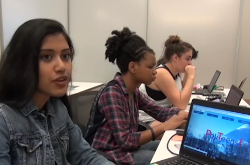코딩하는 소녀들

Over the past 25 years, women have made a lot of progress in getting jobs that have traditionally been held by men.
But computer science is one area that has seen a drop in female workers during that time. Research suggests the percentage of computing jobs filled by women has fallen from 36 percent to 25 percent since 1991.
America’s computing industry is experiencing fast growth. It is estimated that nearly 4.5 million jobs will be created in computing over the next 10 years.
One group trying to make it easier for women to get these jobs is Girls Who Code, a not-for-profit group based in New York. The group partners with technology companies to get girls interested in computers at a young age.
The free services are for students with little or no coding experience. More than 10,000 high school girls have attended Girls Who Code summer camps and after-school programs since 2012.
One of them is Nidhi Allani. She is now beginning her final year in high school. Allani says she got the chance to study a lot of different programming languages over the summer.
“We were able to create different computer games and that was really cool because it was a very immediate result. Once you created it, you saw a result and that was very gratifying.”
Girls Who Code partners with BSA/The Software Alliance in the Washington, D.C. area. That is where Allani signed up to learn coding. Along with a small team, she created a website called PoliTeens. The site provides a platform for young people to share their opinions about political issues.
Allani said the program not only helped her learn computers, but also gave her life skills. “I definitely have become more confident as a person and in my skills and computer science especially.”
Another student, Annie Gomez, said she was not sure what to expect when she began the program.
“I wasn't really saying I'm going into the technology field. But my mind has completely changed for the better. I found that I have a passion for robotics and coding. I just feel full of great ideas.”
High school student Phoebe Suh and her team also created their own website through the BSA/Girls Who Code partnership. She describes the website as a “first-of-its-kind, online database of local crisis resources" in the Washington area.
Organizers say the next step is for students to take their computer knowledge and skills into college. After that, it hopefully gives them a new career.
Tina Furuki is with BSA. “We're hoping that with Girls Who Code, we will be able to help fill that pipeline and close the gender gap in computing.”

